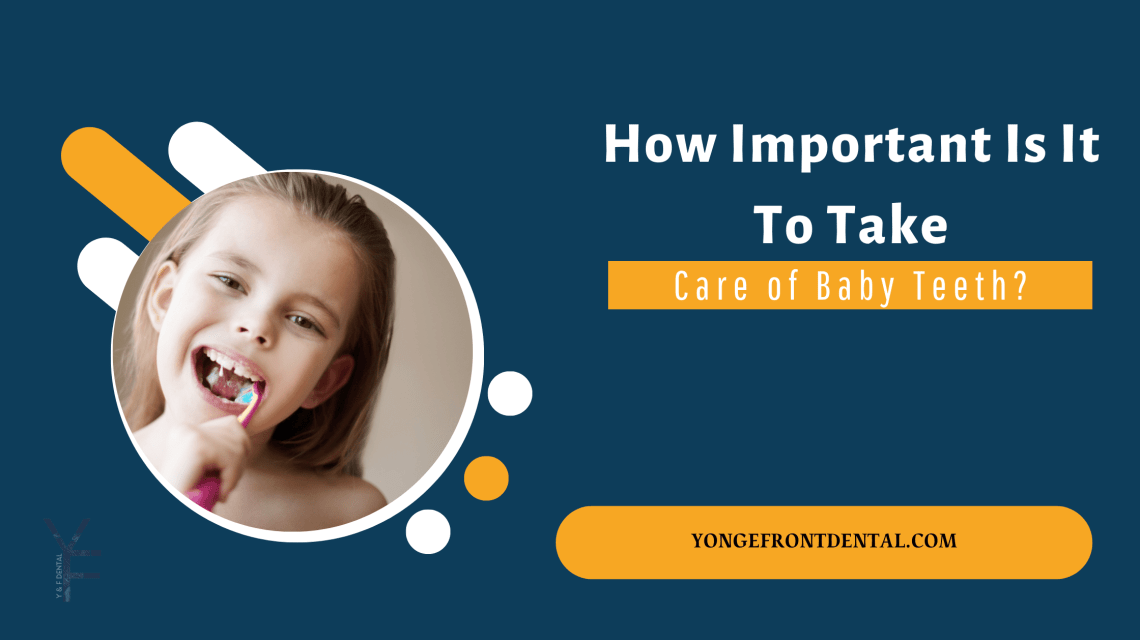When it comes to a child’s early years, parents often focus on nutrition, growth, and overall well-being. However, dental health sometimes takes a backseat, especially when it comes to baby teeth. Since these teeth eventually fall out, many assume they don’t require much care. This misconception can lead to long-term oral health problems.
How Important Is It To Take Care of Baby Teeth?
Baby teeth play a crucial role in a child’s development, affecting everything from eating and speaking to the alignment of permanent teeth. Understanding why they matter and how to take care of them can prevent future dental issues and set the foundation for lifelong oral health.
Why Are Baby Teeth Important?
Baby teeth, also known as primary teeth, are more than just temporary placeholders. They contribute significantly to a child’s growth in several ways:
1. Essential for Chewing and Digestion
Proper digestion begins in the mouth. Baby teeth help children chew food properly, ensuring they receive the necessary nutrients for development. If teeth are damaged or missing too soon, children might struggle with eating a balanced diet, which can impact their health.
2. Help in Speech Development
Teeth play an essential role in speech. When children learn to talk, their tongue, lips, and teeth work together to form sounds correctly. Missing or decayed baby teeth can affect pronunciation, making it harder for children to develop clear speech patterns.
3. Maintain Space for Permanent Teeth
Baby teeth hold space for the adult teeth that will eventually replace them. If they are lost too early due to decay or other issues, the surrounding teeth can shift, causing misalignment and crowding. This can lead to orthodontic problems later in life.
4. Impact on Self-Esteem and Social Confidence
A healthy smile contributes to a child’s confidence. Dental issues such as cavities, discoloration, or missing teeth can make children self-conscious, affecting their interactions with others.

What Happens If Baby Teeth Are Neglected?
Many people assume that cavities in baby teeth aren’t a big deal since these teeth will eventually fall out. However, neglecting oral hygiene at an early stage can have serious consequences.
1. Increased Risk of Cavities and Infections
Tooth decay is one of the most common childhood diseases. When left untreated, cavities in baby teeth can cause pain, infections, and difficulty eating. In some cases, an untreated infection can spread to other parts of the body, leading to more severe health concerns.
2. Potential for Premature Tooth Loss
When cavities progress, they can lead to premature loss of baby teeth. This creates space issues in the mouth, allowing neighboring teeth to shift into the empty space and causing misalignment.
3. Higher Chances of Future Dental Problems
Children who experience cavities in their primary teeth are more likely to develop decay in their permanent teeth. Poor oral hygiene habits established in childhood often carry over into adulthood, increasing the likelihood of ongoing dental issues.
4. Pain and Discomfort Affecting Daily Life
Dental pain can interfere with a child’s ability to concentrate in school, eat comfortably, and sleep well. Chronic pain from untreated cavities can make everyday activities difficult and stressful.

How to Properly Care for Baby Teeth
Starting good oral hygiene habits early sets the stage for a lifetime of healthy teeth and gums. Here are some essential practices for maintaining a child’s dental health:
1. Begin Oral Care Early
- Before teeth appear, clean your baby’s gums with a soft, damp cloth after feeding.
- Once the first tooth emerges, start brushing with a soft-bristled toothbrush and a tiny amount of fluoride toothpaste.
2. Encourage Proper Brushing Habits
- Teach children to brush twice a day using a small, pea-sized amount of fluoride toothpaste.
- Ensure they brush for at least two minutes, covering all surfaces of their teeth.
- Supervise brushing until they can do it effectively on their own, usually around age six.
3. Introduce Flossing at the Right Time
- Once teeth touch each other, start flossing daily to remove plaque between them.
- Show children how to floss properly and make it a part of their routine.
4. Limit Sugary Foods and Drinks
- Avoid giving children sugary snacks and beverages frequently, as these contribute to tooth decay.
- Encourage healthier alternatives like fresh fruits, cheese, and yogurt.
5. Schedule Regular Dental Check-Ups
- A child should visit a dentist by their first birthday or within six months of the first tooth appearing.
- Regular check-ups help identify early signs of decay and other issues before they become serious problems.

Common Myths About Baby Teeth
Many misconceptions surround baby teeth and their care. Let’s debunk a few:
Myth 1: “Baby Teeth Don’t Need to Be Brushed.”
Truth: Cleaning baby teeth is essential from the moment they appear. Without proper care, they can develop cavities, leading to pain and infection.
Myth 2: “Cavities in Baby Teeth Don’t Matter.”
Truth: Cavities in baby teeth can cause discomfort, infections, and even affect the alignment of permanent teeth. Neglecting cavities now can lead to bigger problems later.
Myth 3: “Children Should Avoid Fluoride.”
Truth: Fluoride helps strengthen enamel and prevent cavities. When used in the correct amount, it is safe and beneficial for children.
Myth 4: “Baby Teeth Will Fall Out Anyway, So Losing Them Early is Fine.”
Truth: Losing baby teeth too soon can lead to misalignment and spacing problems, requiring orthodontic treatment later.

When to See a Dentist
Regular dental visits help keep a child’s teeth healthy, but there are times when an appointment is necessary sooner rather than later.
Signs That Indicate a Dental Visit is Needed:
- Persistent tooth pain or sensitivity
- White spots or discoloration on the teeth (early signs of cavities)
- Bleeding gums when brushing or flossing
- Difficulty chewing due to pain
- Unusual swelling or sores in the mouth
Early intervention prevents minor issues from developing into major problems. A pediatric dentist can also provide personalized advice on maintaining oral health.
Final Thoughts
Taking care of baby teeth is an essential part of a child’s overall health and development. These early teeth do more than just help with eating—they support speech development, guide the growth of permanent teeth, and contribute to confidence. Neglecting oral hygiene at a young age can lead to cavities, infections, and long-term dental problems.
By establishing good brushing habits, scheduling regular dental check-ups, and making smart dietary choices, parents can ensure their child’s smile stays healthy. Starting early makes a difference, setting the foundation for strong, lifelong oral health.
If you haven’t already scheduled a dental visit for your child, now is the perfect time to take that step toward a brighter, healthier future.


